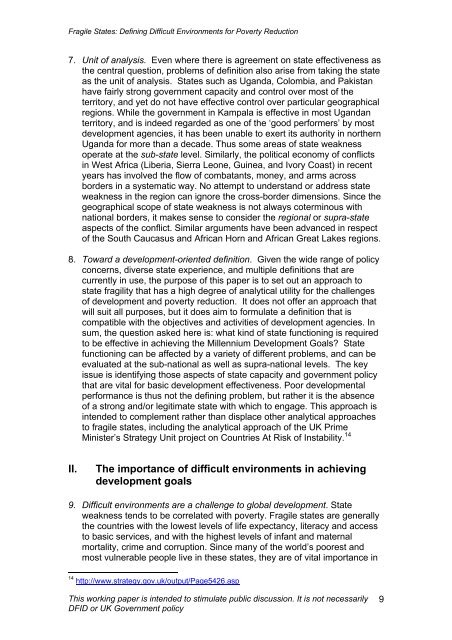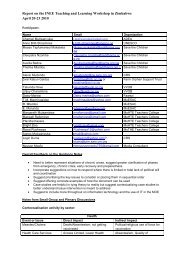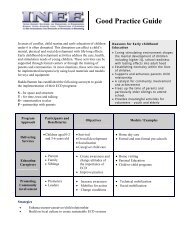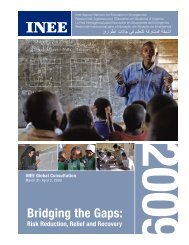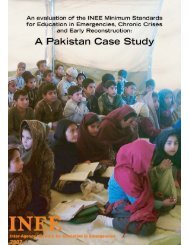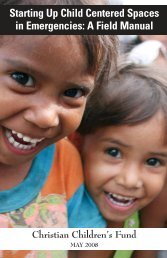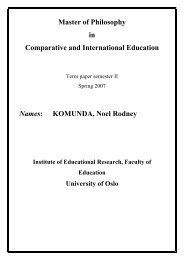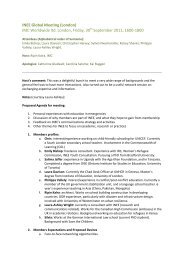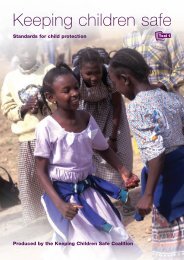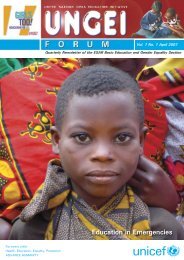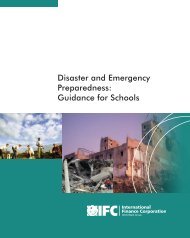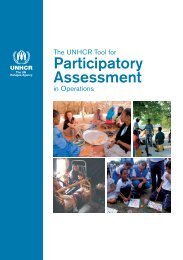Fragile States: Defining Difficult Environments for Poverty ... - INEE
Fragile States: Defining Difficult Environments for Poverty ... - INEE
Fragile States: Defining Difficult Environments for Poverty ... - INEE
Create successful ePaper yourself
Turn your PDF publications into a flip-book with our unique Google optimized e-Paper software.
<strong>Fragile</strong> <strong>States</strong>: <strong>Defining</strong> <strong>Difficult</strong> <strong>Environments</strong> <strong>for</strong> <strong>Poverty</strong> Reduction7. Unit of analysis. Even where there is agreement on state effectiveness asthe central question, problems of definition also arise from taking the stateas the unit of analysis. <strong>States</strong> such as Uganda, Colombia, and Pakistanhave fairly strong government capacity and control over most of theterritory, and yet do not have effective control over particular geographicalregions. While the government in Kampala is effective in most Ugandanterritory, and is indeed regarded as one of the ‘good per<strong>for</strong>mers’ by mostdevelopment agencies, it has been unable to exert its authority in northernUganda <strong>for</strong> more than a decade. Thus some areas of state weaknessoperate at the sub-state level. Similarly, the political economy of conflictsin West Africa (Liberia, Sierra Leone, Guinea, and Ivory Coast) in recentyears has involved the flow of combatants, money, and arms acrossborders in a systematic way. No attempt to understand or address stateweakness in the region can ignore the cross-border dimensions. Since thegeographical scope of state weakness is not always coterminous withnational borders, it makes sense to consider the regional or supra-stateaspects of the conflict. Similar arguments have been advanced in respectof the South Caucasus and African Horn and African Great Lakes regions.8. Toward a development-oriented definition. Given the wide range of policyconcerns, diverse state experience, and multiple definitions that arecurrently in use, the purpose of this paper is to set out an approach tostate fragility that has a high degree of analytical utility <strong>for</strong> the challengesof development and poverty reduction. It does not offer an approach thatwill suit all purposes, but it does aim to <strong>for</strong>mulate a definition that iscompatible with the objectives and activities of development agencies. Insum, the question asked here is: what kind of state functioning is requiredto be effective in achieving the Millennium Development Goals? Statefunctioning can be affected by a variety of different problems, and can beevaluated at the sub-national as well as supra-national levels. The keyissue is identifying those aspects of state capacity and government policythat are vital <strong>for</strong> basic development effectiveness. Poor developmentalper<strong>for</strong>mance is thus not the defining problem, but rather it is the absenceof a strong and/or legitimate state with which to engage. This approach isintended to complement rather than displace other analytical approachesto fragile states, including the analytical approach of the UK PrimeMinister’s Strategy Unit project on Countries At Risk of Instability. 14II.The importance of difficult environments in achievingdevelopment goals9. <strong>Difficult</strong> environments are a challenge to global development. Stateweakness tends to be correlated with poverty. <strong>Fragile</strong> states are generallythe countries with the lowest levels of life expectancy, literacy and accessto basic services, and with the highest levels of infant and maternalmortality, crime and corruption. Since many of the world’s poorest andmost vulnerable people live in these states, they are of vital importance in14 http://www.strategy.gov.uk/output/Page5426.aspThis working paper is intended to stimulate public discussion. It is not necessarilyDFID or UK Government policy9


